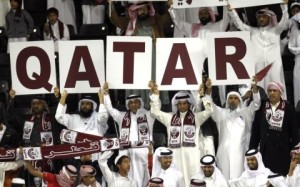Qatar’s “Workers’ Cup” Aims to Address Criticism of Migrant Labor Conditions
Amid growing international criticism over the harsh working conditions faced by migrant laborers in preparation for the 2022 World Cup, Qatar is attempting to present a more positive image of its treatment of foreign workers. Since March 21, the country has been hosting the second edition of the “Workers’ Cup,” a football tournament exclusively for migrant workers employed on construction sites related to the World Cup.

The competition, which will conclude with its final on April 25, is a collaboration between Qsports, a private organization, the Qatar Stars League (Qatar’s football league), and the 2022 World Cup organizing committee. The tournament provides a rare opportunity for workers, predominantly from countries like India, Nepal, Ghana, and Kenya, to showcase their football talents and unwind from their demanding jobs during the week.
Every Friday, matches are held in front of an audience primarily made up of fellow migrant workers. The winning team will receive a cash prize of 18,000 rials (approximately $5,000). For many of the participants, the tournament serves as a welcome break from their labor-intensive roles in construction, plumbing, and electrical work.
Adil Ahmed, director of Qsports, noted that the 24 companies that participated in the competition were selected from an original pool of 120 that were invited to register teams. The event offers players the chance to bond with colleagues from different backgrounds and nationalities, such as Paul Mwangi, a Kenyan employee from GulfQatar Contracting Company, who expressed that his team includes players from diverse countries like India, Nepal, and Ghana.
Despite this initiative, Qatar has faced persistent accusations of mistreating migrant workers, especially regarding working conditions in the lead-up to the World Cup. In March, the International Trade Union Confederation published a report that highlighted what it described as “inhumane” treatment, including reports of preventable deaths and unsafe working environments. Human rights organizations have been vocal in denouncing what they see as “slave-like” conditions on the construction sites.
Qatar is using the Workers’ Cup to counter these criticisms, with some government officials emphasizing the country’s commitment to improving conditions. Nasser Kuwari, a public relations officer for a company operating in Qatar, stated, “We take care of these workers because they are the ones who will build the stadiums and the infrastructure for the World Cup.”
While the tournament provides a platform for migrant workers to enjoy a more festive environment, it remains to be seen whether such initiatives can fully address the deep-rooted issues regarding labor rights and workers’ welfare in the country as it prepares for the global event in 2022.











